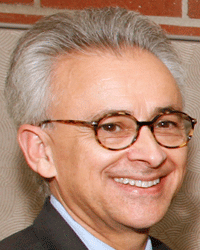Observation
Damasio Receives Grawemeyer Award

The Grawemeyer Foundation has named APS Fellow Antonio Damasio, whose research suggested emotions have a critical effect on reasoning and decision-making, the recipient of the prestigious 2014 Grawemeyer Award for Psychology.
Damasio, David Dornsife Professor and director of the Brain and Creativity Institute at the University of Southern California, won the prize for his somatic marker hypothesis, which scholars have since cited more than 30,000 times. He will receive a $100,000 award.
The University of Southern California professor developed his theory after spending years accumulating evidence that some brain injuries compromise emotional processing and make social and personal decision-making difficult for people. The hypothesis was first published in an influential article in 1996 in the Proceedings of the Royal Society.
“Damasio’s pioneering work showed that emotions, by way of decision-making, are indispensable for the construction of social behavior, and that specific brain systems are responsible,” Award Director Woody Petry said in a statement.
When Damasio first unveiled his findings, they contradicted the current beliefs in his field. However, his research sparked several subsequent experiments in the United States and internationally and has made an impact on neuroscience, neurology, psychiatry, contemporary psychology, and philosophy.
“I am pleased to see the merits of this idea recognized by the Award,” Damasio said. “The Grawemeyer Award has been received by some of the colleagues I most admire in the field of psychology.”





APS regularly opens certain online articles for discussion on our website. Effective February 2021, you must be a logged-in APS member to post comments. By posting a comment, you agree to our Community Guidelines and the display of your profile information, including your name and affiliation. Any opinions, findings, conclusions, or recommendations present in article comments are those of the writers and do not necessarily reflect the views of APS or the article’s author. For more information, please see our Community Guidelines.
Please login with your APS account to comment.